- Home
- Melissa Marr
Guns for the Dead Page 2
Guns for the Dead Read online
Page 2
“Don’t say anything unless I tell you to,” she murmured.
Frank nodded.
At the dead middle of the room, Alicia stopped, pumped her shotgun, and aimed it at the baby grand piano on the stage in front of them.
All around them, people stood and walked out. No one ran. No one said anything. They merely stood, pushed in their chairs, and headed toward the exit.
Once the room was cleared of everyone but the bartender, Alicia winked at Frank and then shot a pipe that was just to the left of the stage. Steam hissed from it.
“I’d like to talk,” she called.
The barmaid caught Frank’s gaze and widened her eyes imploringly. He didn’t think she was in any real danger though. Alicia seemed to be concentrating on the piano. She shot a second pipe. This time, water sluiced from the fragmented pipe. It didn’t pour down on the piano, but it was very close. Something shorted, sparked, and smoked off to the side of the stage.
A man came from behind the curtained doorway. He carried himself with the easy confidence of someone who’s always been obeyed—and had the power and money to keep it that way. He wore an old-fashioned dark gray suit broken up by the scarlet of his tie and his pocket square.
“We have telephones here, Alicia. Telegraphs, too.” He shook his head and then turned his attention to Frank. “Francis, I see you’ve met my dear Alicia. Is she helping you get your sea legs?”
Frank didn’t reply.
“Aaaah, already on her payroll.” The man tsk-ed. “With your mother’s influence, one would expect as much, I suppose. As I doubt Alicia will introduce us”—he touched his fingertips to his chest lightly—“I am Charles.”
How does he know about my family?
Alicia dropped her shotgun on the table, looked over her shoulder at Frank, and said, “Go on up to the bar and grab me a drink.”
He raised his brows at her but kept his mouth shut.
She nodded and turned back to Charles. “Leave Frankie Lee out of it.”
Frank walked over to the polished wooden bar. By the time he got there, the barmaid already had two highball glasses and a wineglass out. She filled two glasses with bourbon and the third with some sort of wine. “The wine is for the boss.”
He looked at her.
“My boss,” she corrected.
And he carried the three drinks back over to the table. As he approached, Alicia poked Charles in the chest. “You can’t bully Boyd. He’s mine.”
“At what point did you gain any authority in my domain? You live in my city because I allow it.” Charles nodded absently to Frank and took a seat.
Alicia grabbed one of the glasses from Frank and upended it. Her shotgun lay like a line bisecting the table. “Make me leave then.”
Charles remained silent. He sipped his drink and stared at Alicia, who now stood with her hands on her hips. Not knowing what else to do, Frank handed his drink to Alicia and stood to the side so she could draw without interference and he could still be there if she needed help. Something older than logic told him that Charles, for all of his polish, wasn’t the sort of man who’d go down easy in a fight.
Even as he thought it, Charles smiled at him. “You’ll do just fine around here, Francis.”
Alicia tensed.
And Frank said the only thing he could think of in the moment. “My name is Frankie Lee, sir.”
* * *
Alicia grinned. Frankie Lee was going to work out just fine.
“I don’t want semiautomatic weapons on my street, Alicia.” Charles motioned at the seat across from him. “I overlook a lot, but there are limits. I explained that to Boyd last week. On this, I will crush you.”
She sat and motioned for Frankie Lee to do the same. She tried the same argument that usually worked: “I don’t see why these—”
“No. Not this time. I play by the rules. That means, here and there, you’ll outmaneuver me. On this, it’s not going to be anytime soon. I overlook revolvers, but that’s where we are staying. The damage, the loss of life … I can’t explain it.” Charles looked genuinely sad, but she knew well enough that the old bastard was able to fake emotions. “You have been out of that world for years, Alicia.”
“Dead. Because you had me killed,” she corrected.
Beside her, Frankie Lee tensed, but he stayed silent.
“True.” Charles sipped his wine. “I’ll negotiate, or I’ll start killing your boys. Permanent death so as they’ll be removed from the city.”
Alicia paused. “And me?”
Charles leaned back in his seat. “I won’t kill you. You know that.”
“Again. Say it, at least. You won’t kill me again.”
“I won’t kill you again, but”—Charles glanced at Frankie Lee—“I’ll kill him, Boyd, Milt, each and every one you employ.”
Charles made a come-hither gesture.
One of her information runners, Lewis, was brought in.
“You all exist because I allow it; you can die because I prefer it. No semiautomatic weapons, Alicia. You will agree to stop pushing this matter,” Charles said softly. “Or he dies.”
She started, “I’m not going to give in because of a threat.”
Charles fixed his gaze on her and snapped his fingers. Lewis crumpled. “There are always unbreakable rules. Right now, this is one of them, and you, of all people, know that I will do what I must to enforce the unbreakable rules.”
Alicia looked at Lewis. Where do they go if they die in the land of the dead? She’d asked that question often enough, but Charles never answered. “No automatic weapons for how long?”
“You have no room to barter,” Charles said.
She suppressed a shiver at the threat in his voice. “Just checking the rules.”
“Thirty years. We can renegotiate then.”
“Thirty years,” Alicia agreed. “But you owe me a replacement, or undo what you did to Lewis.”
For a moment, Charles was silent. Then he nodded and said, “I can’t undo his death, but as a gesture of good faith, I’ll allow you to take one of the staff to replace your employee.”
Alicia kept her expression bland, but she felt the wave of sorrow that she’d been resisting. Charles had finally answered her: Some deaths apparently were even fatal enough that they were out of his reach. She’d known there were other dead cities, and hoped that those who didn’t reanimate here went to another world, a world where they were happier. She knew such worlds existed: Her own loved ones had gone on to them. She’d hoped, though, that the dead folk who were rekilled here went on to other dead worlds, but if that were the case, Charles could have undone Lewis’s death.
Lewis is dead.
Thinking about the metaphysics of living in the land of the dead made her head hurt, so she didn’t. Lewis is dead because I pushed Charles too far. The same trait that had made her good at opposing Charles, both before and after her death, got Lewis killed. Silently, Alicia walked over to the bar and accepted the drink the barmaid held out as she approached.
Behind her, Charles said, “Shall I invite my staff here, or would you deign to visit my home?”
Without looking back at him, she said, “Here.”
* * *
An hour later, Frankie Lee watched as several dozen people tromped into the room. Beside him, Alicia sat with her boots propped on the table as one of them—the only one Charles said was “off limits”—told Alicia their names and roles. Charles had cooks, maids, barmaids, singers, a personal tailor, and God knew how many other employees.
Frankie Lee tuned most of it out after the first fifteen minutes.
Finally, Alicia pointed toward a young woman. “I’ll take her.”
Charles frowned. “There are others—”
“No. Her.” Alicia folded her arms over her chest.
“She’s not suited for your sort of work, Alicia. Perhaps Steven. He’s handy with some sort of martial art, or Elizabeth … she’s an accomplished companion.” Charles gestured toward a pret
ty redhead.
“No.”
“Why?” Charles asked.
The smile Alicia offered was as frightening as her glare. “I’m a good judge of character. You softened at the sight of her.”
Charles frowned at Alicia. “What kind of job do you have for a singer?”
“I’m sure I’ll find a good use for her.” Alicia’s boots thunked to the floor as she stood. “I expect her and Boyd delivered to the inn.”
Frank felt a twinge of worry for the girl, as apparently did Charles. However, Charles merely inclined his head slightly and then walked out.
Once Charles and his people had all left, Alicia glanced at Frankie Lee. “Let’s go.”
“What will you do with her?” he asked.
Alicia leaned as close as she could get without her lips touching his and whispered, “Don’t ask questions I don’t feel like answering.”
He hadn’t ever been intimidated by much, but he knew when to have a healthy respect for a predator. Alicia was definitely on the predator list, and maybe her attitude should intimidate him. She’d shot him when he walked in her door, shot up the tavern, and in general, seemed pretty quick on the trigger. Frank could hear his mother’s voice in his memories: Don’t poke a rattler, Francis. No matter how contrary you’re feeling. Good sense keeps a person alive. He grinned. He was already dead now, and by the way Alicia had reacted to Lewis’s death, Frank was pretty sure that the permanent sort of death was rare.
“I suspect you’re aiming to intimidate me. I probably should step back, but”—Frank stood up, invading her space as he did so—“I’ve grown up with hard-ass women. Tell me what you have in mind for the girl, please?”
“Charles likes her. He won’t strike her easily, and I’ve been thinking about ways to spruce up the inn. He’s a pushover for music, so she must be good. We cater to a … rougher crowd, so it’s a high-risk spot. I can’t lure his favorites away, but this time…” Alicia shrugged. “She can work at my inn, and she’ll be safe because Charles is fond of her and, aside from the people who work for me, no one crosses him.”
“Smart.” Frank smiled at her, and they walked toward the door. “I think I’ll like working for you.”
“Who says you’re hired?”
Frank opened the door. “All the same, I might as well walk back that way.”
Alicia laughed, and together they crossed the weird city in comfortable silence. Once the General Store was in view, she linked her arm with his. “You did good work.”
“Thank you, Alicia.”
She stopped in the street. “I guess you ought to go home.”
“Home?”
Alicia gestured at the inn across the street. An unknown man stood at the door watching them. “Milt will give you a key to whichever room’s yours. It’s not fancy, but it’s ours.”
“Ours,” Frank repeated.
“I do try to take care of what’s mine, Frankie Lee.”
“I’m sorry about Lewis.”
She nodded. “You might get truly killed working for me. I’ll need to be telling the rest of the boys later, but before you decide—”
“Decided when we were there.” Frank shrugged. “I like having a family. Yours feels like home to me.”
“Thank you.” Alicia smiled then and added, “Guess your interview was promising after all.”
Frank chuckled. “Yes, ma’am.”
He had a healing gunshot wound in his thigh, a job, and a home. All told, Frankie Lee figured that it was the best day he’d had since he died. Being dead wasn’t anything like the preacher said it would be, but considering the life Frankie Lee had led, that wasn’t such a bad thing. He nodded his head at his boss and headed off to find his room.
“Frankie Lee?”
He paused and looked at her.
“Is it as bad as all that over there?” she asked haltingly. “It’s been a while since I was alive.”
Frankie Lee thought about the bullets that had ended his own life. A bullet is a bullet. The difference was how many of them tore into him that day. He shrugged. “I won’t be eager for those thirty years to end.”
“Oh.” Alicia faltered, but it lasted only a moment before she said, “Maybe it’d be good for you to tell me what’s new over there in the living world; I can’t take care of everyone if I’m out of touch.”
And Frankie Lee saw the side of his boss that proved he had done right by trusting his guts: Alicia was good people. He kept his smile subdued and nodded. “You’re the boss.”
“I am,” Alicia agreed before going back into the General Store.
For a minute, Frankie Lee stood there, looking at the strange pioneer-era building, and then out over the city where a towering castle loomed. Eras clashed and coexisted. Nothing at all like the preacher said. It wasn’t the life he’d known or the afterlife he’d expected, but he couldn’t wipe the grin off his face. Some things were constant: Finding a place where a person belonged, a job that made a man feel good about himself, and a boss he could respect—those were the keys to a happy life. Or a happy afterlife, in this case.

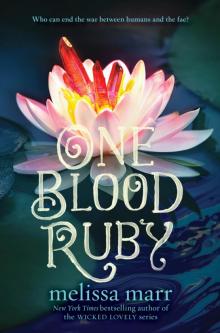 One Blood Ruby
One Blood Ruby Desert Tales
Desert Tales Faery Tales & Nightmares
Faery Tales & Nightmares Enthralled: Paranormal Diversions
Enthralled: Paranormal Diversions Wicked Lovely
Wicked Lovely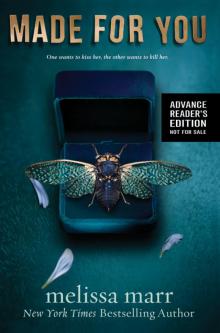 Made for You
Made for You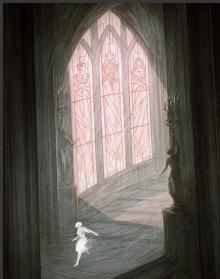 The Maiden Thief
The Maiden Thief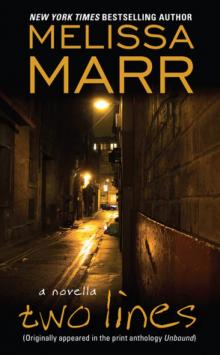 Two Lines
Two Lines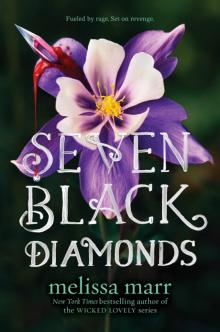 Seven Black Diamonds
Seven Black Diamonds Love Struck
Love Struck Guns for the Dead
Guns for the Dead Radiant Shadows
Radiant Shadows Ink Exchange
Ink Exchange Darkest Mercy
Darkest Mercy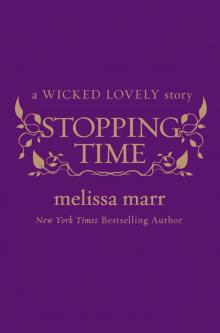 Stopping Time and Old Habits
Stopping Time and Old Habits Carnival of Secrets
Carnival of Secrets Carnival of Lies
Carnival of Lies This Fond Madness
This Fond Madness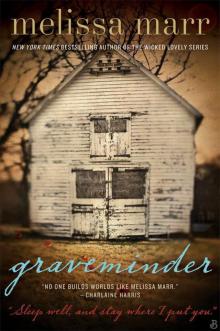 Graveminder
Graveminder The Arrivals
The Arrivals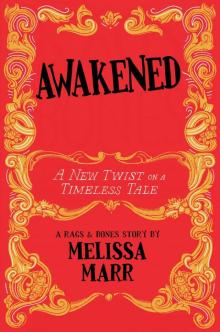 Awakened: A New Twist on a Timeless Tale
Awakened: A New Twist on a Timeless Tale Cold Iron Heart: A Wicked Lovely Novel
Cold Iron Heart: A Wicked Lovely Novel Summer Bound: A Wicked Lovely Story
Summer Bound: A Wicked Lovely Story The Wicked & The Dead (Faery Bargains Book 1)
The Wicked & The Dead (Faery Bargains Book 1) Dark Court Faery Tales
Dark Court Faery Tales of Maidens & Swords
of Maidens & Swords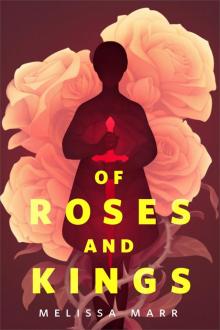 Of Roses and Kings
Of Roses and Kings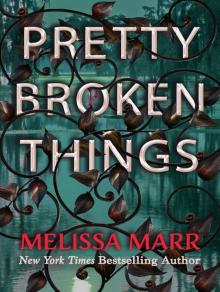 Pretty Broken Things
Pretty Broken Things Enthralled
Enthralled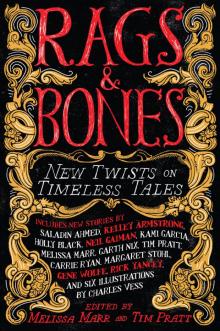 Rags & Bones
Rags & Bones Ink Exchange tf-2
Ink Exchange tf-2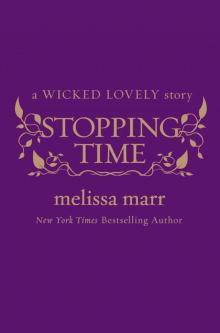 Stopping Time
Stopping Time Tales of Folk & Fey
Tales of Folk & Fey Hex on the Beach
Hex on the Beach Wicked Lovely Free with Bonus Material
Wicked Lovely Free with Bonus Material Wicked Lovely tf-1
Wicked Lovely tf-1 Wicked Lovely with Bonus Material
Wicked Lovely with Bonus Material Carnival of Souls cos-1
Carnival of Souls cos-1 Radiant Shadows tf-4
Radiant Shadows tf-4 Darkest Mercy tf-5
Darkest Mercy tf-5 Carnival of Souls
Carnival of Souls Desert Tales: A Wicked Lovely Companion Novel
Desert Tales: A Wicked Lovely Companion Novel Fragile Eternity tf-3
Fragile Eternity tf-3 Old Habits
Old Habits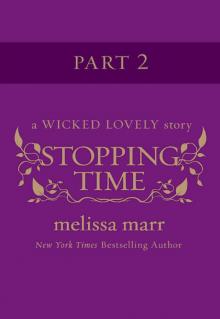 Stopping Time, Part 2
Stopping Time, Part 2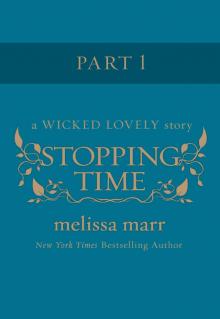 Stopping Time, Part 1
Stopping Time, Part 1